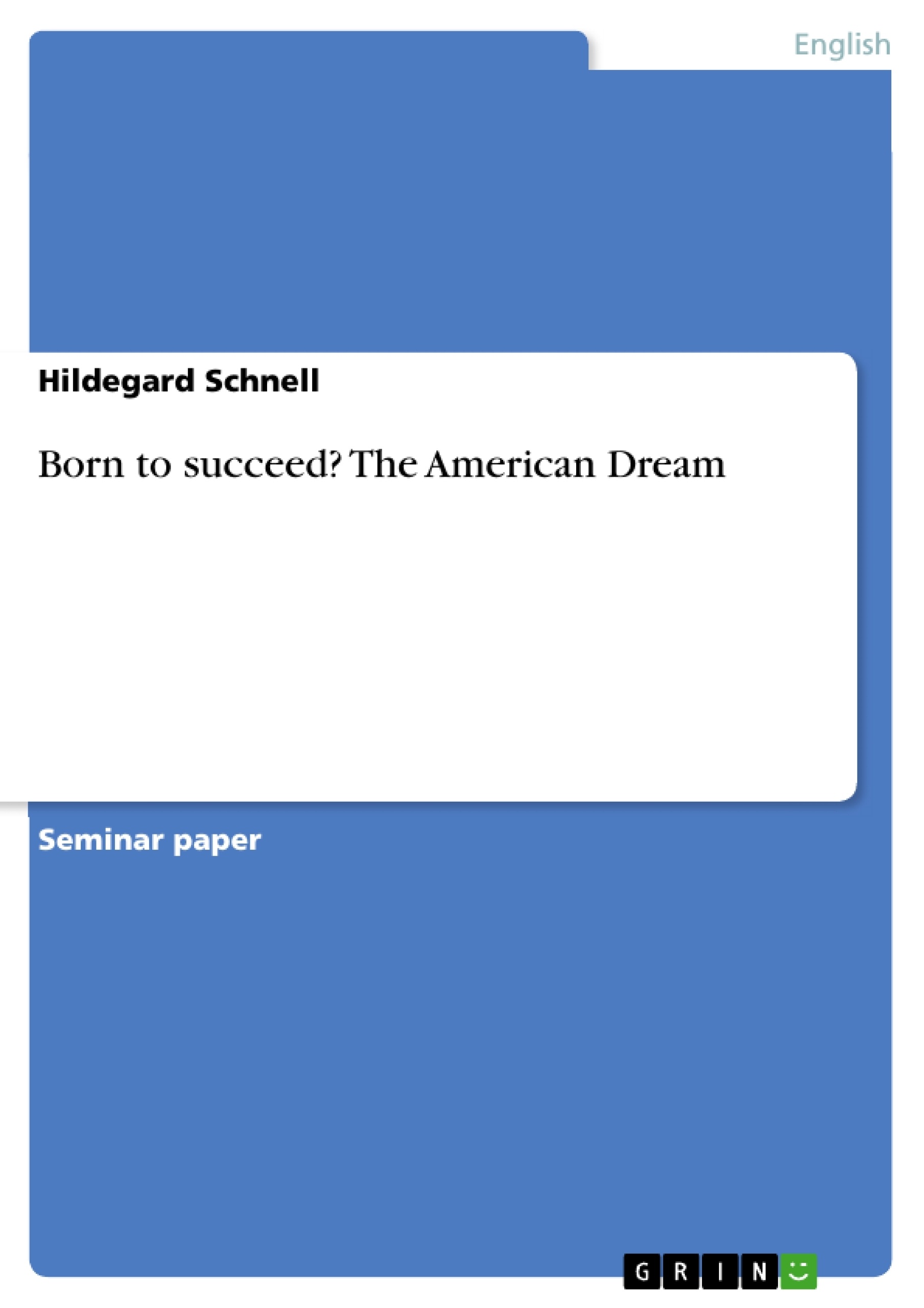“We were brought up to succeed, weren’t we?” (Arthur Miller “The Price”, 109). Is this true? Were we really brought up only to succeed in order to achieve material aplenty and is this what the American Dream is all about: Success as the reason for living?
In my research paper I will try to find an answer to these questions by looking at the origin of the concept of the American Dream, the critical interpretation of the American Dream referring to itschange of values. Furthermore, I am going to discuss the influence of the American Dream on popular imagination and, as a conclusion, I will briefly state the effect it has on political rhetoric.
So, the main purpose of my paper is to show that the notion of the American Dream has not always been identified with materialism but with success primarily as a God given task intended for self-salvation. Therefore, I will point out how this aspect of a success in religious and moral terms changed into an aspect of material success only. Further, I will show, according to this change that the aspect of material success promotes selfish individuals instead of a “Great Society” in which the American Dream is realized in the community since there is “nothing whatever in a fortune merely in itself” (Adams “The Epic of America”, 416).
While the American Dream stands on the one hand for a land of opportunity where everyone is given the chance of attaining something according to one’s ability, the American Dream stands on the other hand for a struggle to succeed without much social or emotional support that eventually turns into an American nightmare.
Inhaltsverzeichnis (Table of Contents)
- Introduction
- The American Dream
- Analyzing the American Dream's concept and values
- Why is the American Dream a key concept?
- Changes in the values of the American Dream
- The American Dream turning into an American nightmare
- Critical interpretation of the American Dream
- Influence of the American Dream's success mythology on popular imagination
- Conclusion
Zielsetzung und Themenschwerpunkte (Objectives and Key Themes)
The paper explores the origin and evolution of the American Dream concept, its critical interpretation, and its impact on popular imagination. It aims to demonstrate that the American Dream has not always been solely about materialism but also about success as a God-given task for self-salvation. The paper further analyzes how this religious and moral aspect of success transformed into an emphasis on material success.
- The historical evolution of the American Dream concept
- The shift from religious and moral success to material success
- The impact of the American Dream on popular imagination
- The critical interpretation of the American Dream
- The role of the American Dream in political rhetoric
Zusammenfassung der Kapitel (Chapter Summaries)
- Introduction: This chapter introduces the research question and outlines the paper's objectives. It explores the changing concept of the American Dream, highlighting its transition from a religious and moral notion of success to an emphasis on material prosperity.
- The American Dream: This chapter delves into the original meaning of the American Dream, emphasizing its core concept of opportunity and achievement. It examines the historical context of the American Dream, highlighting its appeal to lower classes and different ethnic backgrounds.
- Analyzing the American Dream's concept and values: This section explores the reasons behind the American Dream's association with success through hard work and discipline. It analyzes the evolution of its values, discussing the shift from an emphasis on hard labor and discipline to an emphasis on material prosperity.
Schlüsselwörter (Keywords)
The main keywords and focus topics of the paper include: American Dream, success, materialism, historical context, critical interpretation, popular imagination, political rhetoric, religious and moral values, social mobility, classlessness, opportunity, achievement, and social support.
Frequently Asked Questions
What was the original meaning of the American Dream?
Originally, it was less about materialism and more about success as a God-given task intended for self-salvation and moral achievement.
How did the values of the American Dream change over time?
The focus shifted from religious and moral terms, emphasizing hard work and discipline, toward a primary focus on material wealth and individual prosperity.
What is the "American Nightmare"?
It refers to the struggle to succeed without social or emotional support, leading to isolation and failure despite the promise of opportunity.
How does the American Dream influence political rhetoric?
It is frequently used by politicians to invoke a sense of national identity, classlessness, and the belief that anyone can succeed regardless of their background.
What role does social mobility play in this concept?
A core tenet of the American Dream is the belief in a classless society where ability and effort determine one's status rather than birthright.
- Quote paper
- Hildegard Schnell (Author), 2006, Born to succeed? The American Dream, Munich, GRIN Verlag, https://www.grin.com/document/62493



